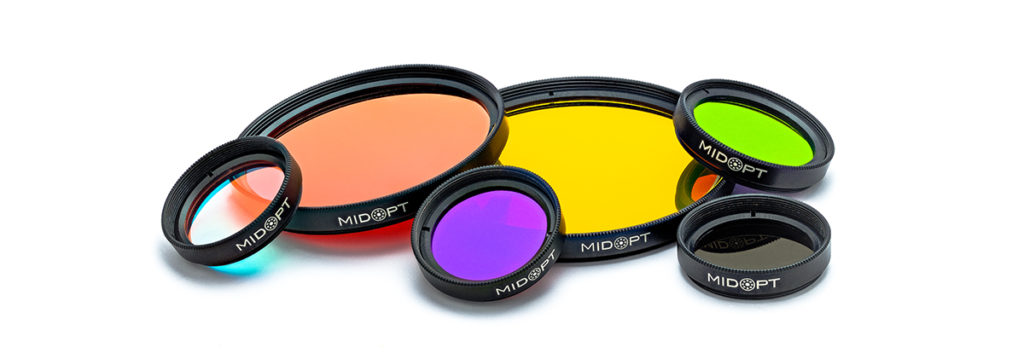Filter Types
MidOpt filters are the premier solution for industrial imaging to ensure flawless control, dependable results, unmatched repeatability and exceptional image quality for monochrome and color vision systems. Filters have the ability to block all unwanted ambient light and pass only the necessary light output while increasing contrast and resolution. Whether your vision system is counting items, reading codes or examining specific objects for defects, optical filters can help you achieve a more stable, accurate system. Many varieties of optical filters are available, depending on your application. Just some of the industries we serve include machine vision/factory automation, security and surveillance, license plate recognition/ITS, medical and life science, agricultural inspection/NDVI, aerial imaging, motion analysis, photography and cinematography.
Bandpass Filters
Bandpass Filters are often one of the easiest ways to drastically improve image quality. They are designed with a Gaussian transmission curve to emulate the output of the most common types of LEDs used in machine vision and are great for testing the effects of monochromatic imaging. All MidOpt Bandpass Filters have an anti-reflection coating to ensure maximum transmission.
Dual Bandpass Filters
Dual Bandpass Filters transmit two specific wavelength ranges through a single filter. They allow for natural color rendition during the day and near infrared illumination at night ensuring that precise, high-contrast images are obtained. This makes them a great choice for intelligent traffic solutions, security surveillance and agricultural inspection.
Longpass Filters
Longpass Filters provide seamless transition from reflection to transmission and are available in many wavelengths, depending on the needs of your system. Longpass Filters are best used in a controlled environment when multiple wavelengths need to be passed and are an economical solution for blocking excitation light in fluorescent applications.
Shortpass/NIR Cut Filters
Shortpass Filters have unmatched transition from transmission to reflection and provide excellent contrast. They’re best used in color imaging to achieve natural color rendering and block infrared saturation.
Polarizing Filters
Polarizing Filters reduce reflection, enhance contrast and detect imperfections in transparent materials. They’re best used for applications that have overwhelming reflection when inspecting objects on shiny surfaces.
Neutral Density Filters
Neutral Density Filters reduce light saturation and are recognized in the industry as “sunglasses for your system.” Both absorptive and reflective style options are available, and they’re best used for applications where there’s overpowering brightness. They serve as great solutions for lens aperture control and increasing field depth.
Protective Filters
Protective Filters are best used for lens protection. They’re made from high-quality polished glass and optical-grade acrylic and are available with anti-reflection coating to maximize transmission. Acrylic Protective Filters have an abrasion-resistant coating and are useful for FDA/EMA applications.
Light Balancing Filters
Light Balancing Filters are used to achieve a more accurate color rendering and to keep costs low with LED or metal halide lighting. By blocking most of the blue spectrum transmitted by cool white LED lamps, the object being inspected has a more natural look to the human eye.

